2023届高考英语语法点梳理专题:定语从句 课件 (25张)
文档属性
| 名称 | 2023届高考英语语法点梳理专题:定语从句 课件 (25张) | 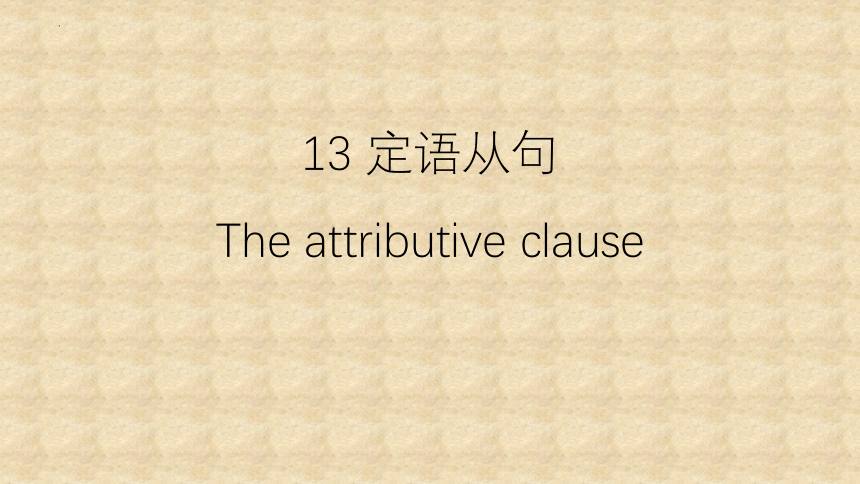 | |
| 格式 | zip | ||
| 文件大小 | 142.9KB | ||
| 资源类型 | 教案 | ||
| 版本资源 | 通用版 | ||
| 科目 | 英语 | ||
| 更新时间 | 2022-08-04 22:33:30 | ||
图片预览

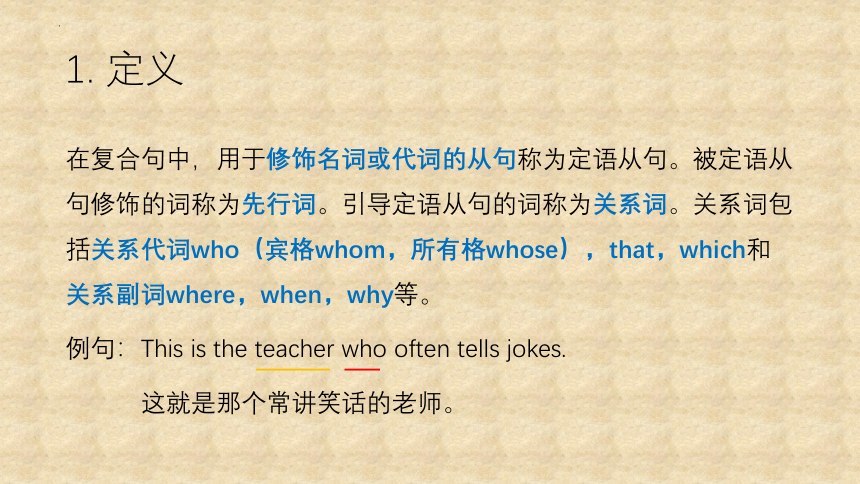
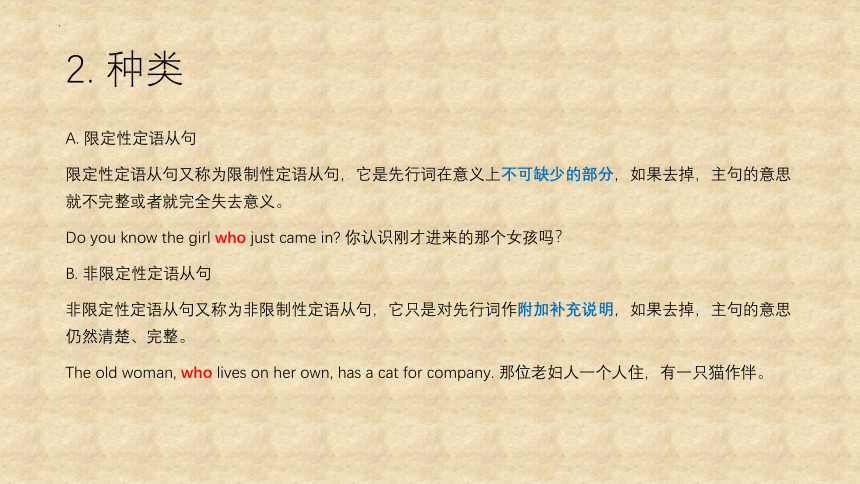
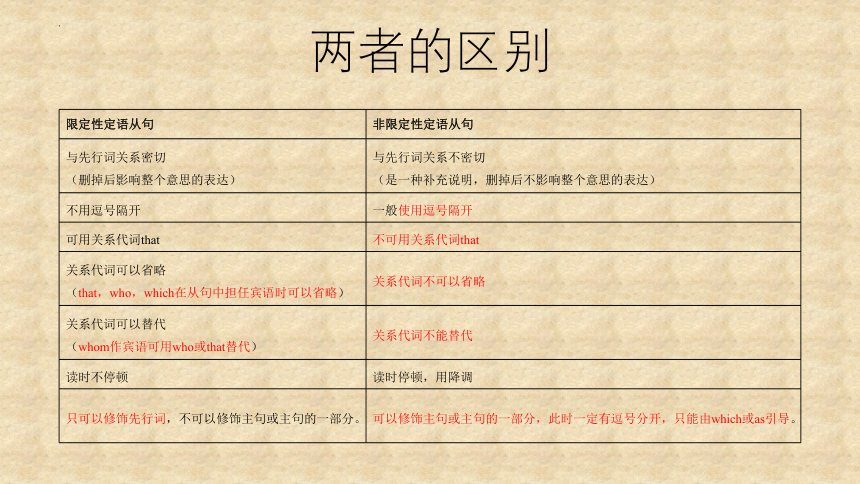
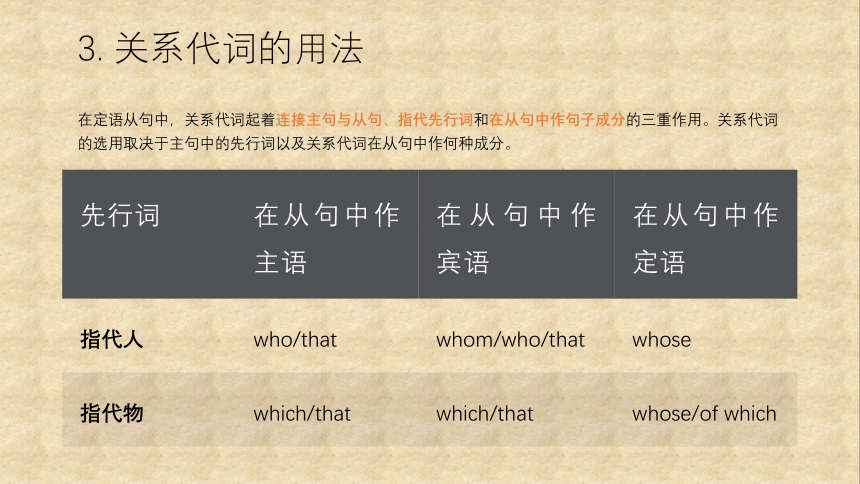
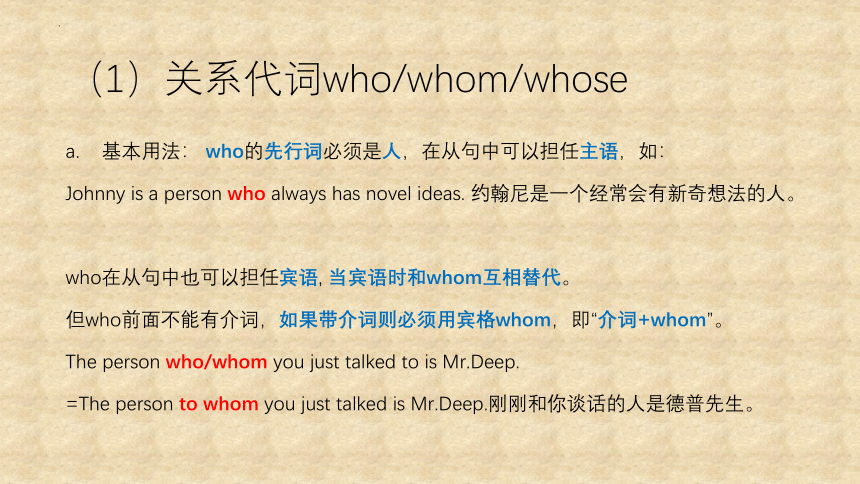
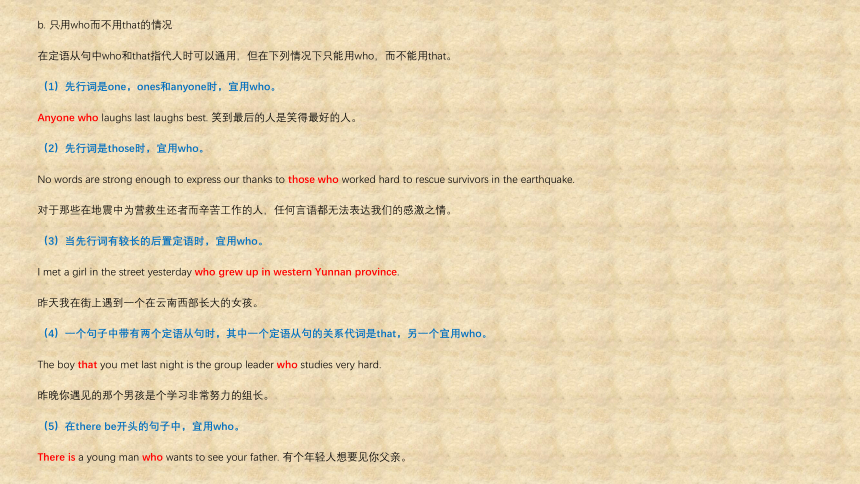
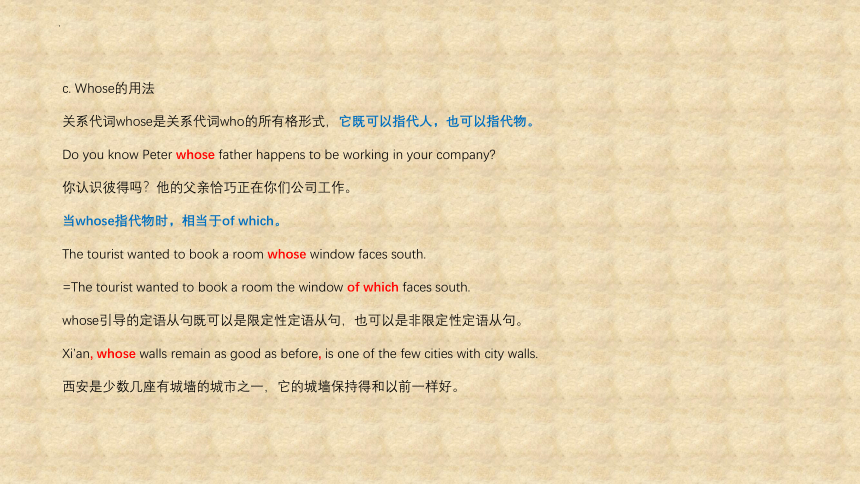
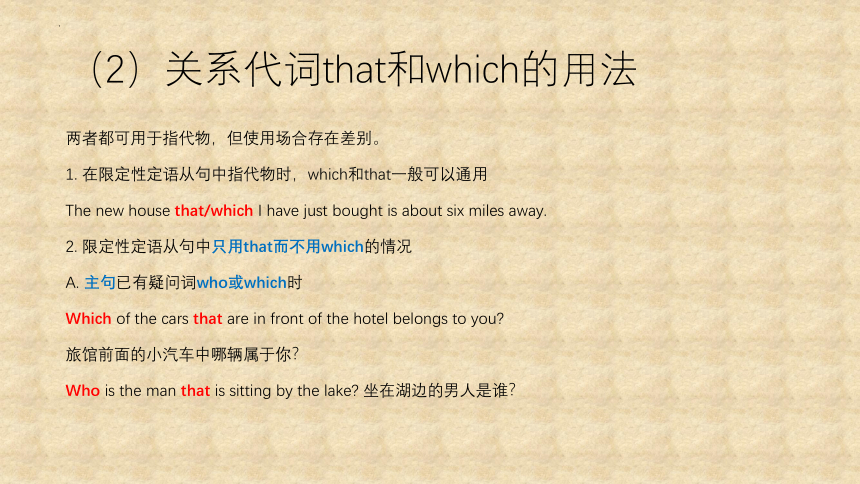
文档简介
(共25张PPT)
13 定语从句
The attributive clause
1. 定义
在复合句中,用于修饰名词或代词的从句称为定语从句。被定语从句修饰的词称为先行词。引导定语从句的词称为关系词。关系词包括关系代词who(宾格whom,所有格whose),that,which和关系副词where,when,why等。
例句:This is the teacher who often tells jokes.
这就是那个常讲笑话的老师。
2. 种类
A. 限定性定语从句
限定性定语从句又称为限制性定语从句,它是先行词在意义上不可缺少的部分,如果去掉,主句的意思就不完整或者就完全失去意义。
Do you know the girl who just came in 你认识刚才进来的那个女孩吗?
B. 非限定性定语从句
非限定性定语从句又称为非限制性定语从句,它只是对先行词作附加补充说明,如果去掉,主句的意思仍然清楚、完整。
The old woman, who lives on her own, has a cat for company. 那位老妇人一个人住,有一只猫作伴。
两者的区别
限定性定语从句 非限定性定语从句
与先行词关系密切 (删掉后影响整个意思的表达) 与先行词关系不密切
(是一种补充说明,删掉后不影响整个意思的表达)
不用逗号隔开 一般使用逗号隔开
可用关系代词that 不可用关系代词that
关系代词可以省略 (that,who,which在从句中担任宾语时可以省略) 关系代词不可以省略
关系代词可以替代 (whom作宾语可用who或that替代) 关系代词不能替代
读时不停顿 读时停顿,用降调
只可以修饰先行词,不可以修饰主句或主句的一部分。 可以修饰主句或主句的一部分,此时一定有逗号分开,只能由which或as引导。
3. 关系代词的用法
在定语从句中,关系代词起着连接主句与从句、指代先行词和在从句中作句子成分的三重作用。关系代词的选用取决于主句中的先行词以及关系代词在从句中作何种成分。
先行词 在从句中作主语 在从句中作宾语 在从句中作定语
指代人 who/that whom/who/that whose
指代物 which/that which/that whose/of which
(1)关系代词who/whom/whose
基本用法: who的先行词必须是人,在从句中可以担任主语,如:
Johnny is a person who always has novel ideas. 约翰尼是一个经常会有新奇想法的人。
who在从句中也可以担任宾语, 当宾语时和whom互相替代。
但who前面不能有介词,如果带介词则必须用宾格whom,即“介词+whom”。
The person who/whom you just talked to is Mr.Deep.
=The person to whom you just talked is Mr.Deep.刚刚和你谈话的人是德普先生。
b. 只用who而不用that的情况
在定语从句中who和that指代人时可以通用,但在下列情况下只能用who,而不能用that。
(1)先行词是one,ones和anyone时,宜用who。
Anyone who laughs last laughs best. 笑到最后的人是笑得最好的人。
(2)先行词是those时,宜用who。
No words are strong enough to express our thanks to those who worked hard to rescue survivors in the earthquake.
对于那些在地震中为营救生还者而辛苦工作的人,任何言语都无法表达我们的感激之情。
(3)当先行词有较长的后置定语时,宜用who。
I met a girl in the street yesterday who grew up in western Yunnan province.
昨天我在街上遇到一个在云南西部长大的女孩。
(4)一个句子中带有两个定语从句时,其中一个定语从句的关系代词是that,另一个宜用who。
The boy that you met last night is the group leader who studies very hard.
昨晚你遇见的那个男孩是个学习非常努力的组长。
(5)在there be开头的句子中,宜用who。
There is a young man who wants to see your father. 有个年轻人想要见你父亲。
c. Whose的用法
关系代词whose是关系代词who的所有格形式,它既可以指代人,也可以指代物。
Do you know Peter whose father happens to be working in your company
你认识彼得吗?他的父亲恰巧正在你们公司工作。
当whose指代物时,相当于of which。
The tourist wanted to book a room whose window faces south.
=The tourist wanted to book a room the window of which faces south.
whose引导的定语从句既可以是限定性定语从句,也可以是非限定性定语从句。
Xi’an, whose walls remain as good as before, is one of the few cities with city walls.
西安是少数几座有城墙的城市之一,它的城墙保持得和以前一样好。
(2)关系代词that和which的用法
两者都可用于指代物,但使用场合存在差别。
1. 在限定性定语从句中指代物时,which和that一般可以通用
The new house that/which I have just bought is about six miles away.
2. 限定性定语从句中只用that而不用which的情况
A. 主句已有疑问词who或which时
Which of the cars that are in front of the hotel belongs to you
旅馆前面的小汽车中哪辆属于你?
Who is the man that is sitting by the lake 坐在湖边的男人是谁?
B. 先行词既有人又有物时
He talked about the schools and teachers that he had visited. 他谈到了他访问过的学校和老师。
C. 先行词为all,much,few,little,something,everything,anything,nothing,none等不定代词时
It’s easy to do the repair. All that you need is a hammer and some nails.
做修理很容易。你所需要的全部东西是一把锤子和一些钉子。
D. 先行词有形容词最高级修饰时
This is the best way that has been used against pollution.这是用来防止污染的最好的办法。
E. 先行词有序数词修饰时
This is the third time that they have met.这是他们第三次见面。
F. 先行词有the very,the only,the same,any,few,little,no,all,one of等词修饰时
This is the very room that I slept in that evening.这正是我那天晚上睡过的房间。
G. 有两个定语从句,其中一个关系代词已用which,另一个宜用that
Edison built up a factory which produced things that had never been seen before.
3.只用which而不用that的情况
A. 引导非限定性定语从句时只用which而不用that
The fish, which I bought this morning, is very fresh.
(which指代fish)
Jim passed the driving test, which surprised everybody in the office.
(which指代整个主句)
The factory produces half a million pairs of shoes every year, most of which are sold abroad.
这家工厂每年生产50万双鞋,大都销往国外。
(which前常用none/neither/most/both/each/all/a little of等词修饰。)
B. 在限定性定语从句中,关系代词前有介词时只用which而不用that
This is the hotel in which you will stay.
如果把介词in后移,那么关系代词既可以用which,也可以用that,还可以省略。
This is the hotel (which/that) you will stay in. 这就是你将要住的旅馆。
C. 有两个定语从句,其中一个关系代词已用that,另一个宜用which
Let me show you the novel that I borrowed from the library which was newly open.
让我给你看看我从新开放的图书馆借来的小说。
【总结】
which可用于非限定性定语从句中,代替物、整个句子或主句中的一部分, 也可用于介词之后,构成“介词+which”, 而that 不能用于上述两种情况。
4. 关系副词的用法
关系副词和关系代词一样,具有各种作用:在定语从句中代替先行词、在从句中作状语、把两个句子连接成为一个带有定语从句的主从复合句等。具体选用什么关系副词,主要取决于关系副词在从句中充当什么类型的状语。
先行词 关系副词 关系副词在从句中充当的句子成分
指地点 where 地点状语
指时间 when 时间状语
指原因 why 原因状语
(1)关系副词where
由where引导的定语从句,其先行词主要是表示地点的名词,如building,city,room等,where在从句中作地点状语。
The hotel where we stayed was very clean. 我们呆过的那家旅馆很干净。
拆分:【We stayed at the hotel.】 + 【The hotel was very clean.】
Where指代了at the hotel, 作从句中的地点状语。
补充:可以用关系代词来表述
The hotel where we stayed was very clean.
=The hotel at which we stayed was very clean.
=The hotel (that/which) we stayed at was very clean.
(2)关系副词when
由when引导的定语从句,其先行词主要是表示时间的名词,如time,day,date等,when在从句中作时间状语。
I’ll never forget the time when we first met.我永远不会忘记我们第一次相遇时的情景。
拆分:【I‘ll never forget the time.】+【We first met during the time.】
(when在从句中代替during the time,作时间状语)
补充:可以用关系代词表述
I’ll never forget the time when we first met.
=I’ll never forget the time during which we first met.
小试牛刀:The date ___________________ he joined the ANC Youth League was August 5th.
他加入南非国民议会青年同盟的日期是8月5日。
【注意】从语法来讲,这个句子中的定语从句只能用when引导,但在口语中,常用that代替when,也可以省略。
(when/that)
(3)关系副词why
由why引导的定语从句,经常会用在先行词reason的后面,why在从句中作原因状语。
The reason why I got a job was that I worked hard. 我获得一份工作的原因是我工作努力。
补充:可以用关系代词表述:
The reason why I got a job was that I worked hard.
=The reason for which I got a job was that I worked hard.
=The reason (that)I got a job was that I worked hard.
注意:一般来讲,在定语从句中,只要先行词是the reason,它的关系副词就是why;和when一样,在口语中,关系副词why常被that代替,也可以省略。
Quiz:
1. 区分带reason的定语从句与表语从句
I know the reason why she studies so well.
The reason is that he is always careless in his work.
2. 关系词的选择
This is the college ______________ I visited.
This is the college ________________________ I studied three years ago.
I’ll never forget the day _______________ we spent together.
I’ll never forget the day _______________________ I got married.
定语从句
表语从句
(that/which)
where/at which/(that)
(that/which)
when/on which/(that)
5. 关系代词和关系副词的省略
A. 在非限定性定语从句中,关系代词和关系副词都不可以省略。
B. 以下情况,关系词可以省略:
1. Sorry, I forget to bring the magazine (which/that) you want.
(限从里,关系代词作动词宾语时可以省略)
2. This is the government building (which/that) my father works in.
(限从里,关系代词作介词宾语时可以省略)
3. There’s nothing (that) I can do about it.
(There be句型之后的定从,关系代词作主语或宾语时都可省略)
4. He still remembers the time (when) he studied in Berlin.
(限从中,若在口语和非正式语体中,某些表示地点、时间、原因的名词后的关系副词可以省略。例如,先行词the time,every time,each time,the moment等后面的关系副词when可以省略;先行词the reason后面的关系副词why也可以省略。)
6. as引导的定语从句
① as引导的限定性定语从句
a. such...as...和the same...as...的用法
such...as...意为“像……一样的,像……之类”;the same...as...意为“和……同样的”。在这两个句型中,as是关系代词,such和same作定语,修饰主句里的某个名词(或代词),这个名词(或代词)是由as引导的定语从句的先行词,as在从句中可担任主语、宾语或表语。
We have found such materials as are used in their factory.(as在从句中作主语)
我们找到了像他们厂里用的那种材料。
We have found the same materials as are used in their factory.
我们找到了和他们厂里用的那种材料一样的材料(同种类材料)。
【区分】We have found the same materials that are used in their factory.
我们找到了他们厂里用的那种材料(同一批材料)。
b. such as...的用法
such as...中的such为代词,意思为“这样的人或物”,as在从句中作宾语,修饰先行词such。
This book is not such (n. 这样的书) as I expect.这不是一本我所盼望的书。
补充:such as还可以表示“诸如,例如,像……那样的”的意思,此时其后跟名词或名词短语等,如:
They bought a lot of fruit, such as apples, oranges, etc.
② as引导的非限定性定语从句
as可以像which一样引导非限定性定语从句,用来代表整个句子的内容,它的先行词可以是名词,也可以是不定式短语或整个句子。as在从句中作主语、宾语或表语。此外,有些as引导的定语从句已成为固定用法,如:
例句:As we know, smoking is harmful to one’s health. 正如我们所知,吸烟有害健康。
as we know 正如我们所知 as is well known 众所周知 as is reported 正如报道的那样
as was expected 正如预料的那样 as is often the case 像通常那样 as has been said before 如上所述
【比较】as和which引导的非限定性定语从句的联系和区别
as和which都可以代替整个句子,当定语从句至于主句之后时,as和which可以互换使用。
He didn’t tell me any news, as/which upset me. 他没有告诉我任何消息,这使我很不安。
which引导的定语从句,代表整个主句时不能放在主句之前。as引导的定语从句,代表整个主句时可放在主句之前或之后,有时也可放在主语与谓语之间。
As is reported in the newspapers, talks between the two countries are making progress.
=Talks between the two countries, as is reported in the newspapers, are making progress.
正如报道的那样,这两个国家之间的会谈正在进展中。
6. 定语从句和同位语的区别
1.根据that在从句中是否作成分来判定
that在定语从句中担任句子成分,而在同位语从句中不作成分。
The news (that) you told me last week is not true.你上周告诉我的消息不是真的。
(that引导的定语从句,说明是哪一个news,that在从句中担任told的宾语。)
The news that the leader will come here is not true. 领导将要来这儿的消息不是真的。
(that引导的同位语从句,说明news的具体内容,that在从句中不担任任何成分。)
2.根据意思来判断
在引导词前加is后,如果句子成立就是同位语从句,否则就不是。
The news that you told me last week is not true.
→(误)The news is (=)that you told me last week.
(因为the news不能等于you told me last week,所以句子不成立,不是同位语从句,而是定语从句。)
The news that the leader will come here is not true.
→(正)The news is (=)that the leader will come here.
(因为the news等于the leader will come here,句子成立,所以是同位语从句。)
6. 定语从句和同位语的区别
使用定语从句的注意事项
定语从句中的主谓一致
What和how不能引导定语从句
注意“名词/代词+介词+关系代词”的结构
The professor gave us a lecture yesterday, the meaning of which I couldn’t understand completely.
那位教授昨天给我们上了一堂课,我不能完全理解那堂课的意思。
Quiz:
1. Gun control is a subject __________ Americans have argued for a long time.
A. of which B. with which C. about which D. into which
2. Whenever I met her, __________ was fairly often, she greeted me with a sweet smile.
A. who B. which C. when D. that
3. I have often reached a point in my life __________ I am supposed to make decisions of my own.
A. which B. where C. how D. why
C
B
B
13 定语从句
The attributive clause
1. 定义
在复合句中,用于修饰名词或代词的从句称为定语从句。被定语从句修饰的词称为先行词。引导定语从句的词称为关系词。关系词包括关系代词who(宾格whom,所有格whose),that,which和关系副词where,when,why等。
例句:This is the teacher who often tells jokes.
这就是那个常讲笑话的老师。
2. 种类
A. 限定性定语从句
限定性定语从句又称为限制性定语从句,它是先行词在意义上不可缺少的部分,如果去掉,主句的意思就不完整或者就完全失去意义。
Do you know the girl who just came in 你认识刚才进来的那个女孩吗?
B. 非限定性定语从句
非限定性定语从句又称为非限制性定语从句,它只是对先行词作附加补充说明,如果去掉,主句的意思仍然清楚、完整。
The old woman, who lives on her own, has a cat for company. 那位老妇人一个人住,有一只猫作伴。
两者的区别
限定性定语从句 非限定性定语从句
与先行词关系密切 (删掉后影响整个意思的表达) 与先行词关系不密切
(是一种补充说明,删掉后不影响整个意思的表达)
不用逗号隔开 一般使用逗号隔开
可用关系代词that 不可用关系代词that
关系代词可以省略 (that,who,which在从句中担任宾语时可以省略) 关系代词不可以省略
关系代词可以替代 (whom作宾语可用who或that替代) 关系代词不能替代
读时不停顿 读时停顿,用降调
只可以修饰先行词,不可以修饰主句或主句的一部分。 可以修饰主句或主句的一部分,此时一定有逗号分开,只能由which或as引导。
3. 关系代词的用法
在定语从句中,关系代词起着连接主句与从句、指代先行词和在从句中作句子成分的三重作用。关系代词的选用取决于主句中的先行词以及关系代词在从句中作何种成分。
先行词 在从句中作主语 在从句中作宾语 在从句中作定语
指代人 who/that whom/who/that whose
指代物 which/that which/that whose/of which
(1)关系代词who/whom/whose
基本用法: who的先行词必须是人,在从句中可以担任主语,如:
Johnny is a person who always has novel ideas. 约翰尼是一个经常会有新奇想法的人。
who在从句中也可以担任宾语, 当宾语时和whom互相替代。
但who前面不能有介词,如果带介词则必须用宾格whom,即“介词+whom”。
The person who/whom you just talked to is Mr.Deep.
=The person to whom you just talked is Mr.Deep.刚刚和你谈话的人是德普先生。
b. 只用who而不用that的情况
在定语从句中who和that指代人时可以通用,但在下列情况下只能用who,而不能用that。
(1)先行词是one,ones和anyone时,宜用who。
Anyone who laughs last laughs best. 笑到最后的人是笑得最好的人。
(2)先行词是those时,宜用who。
No words are strong enough to express our thanks to those who worked hard to rescue survivors in the earthquake.
对于那些在地震中为营救生还者而辛苦工作的人,任何言语都无法表达我们的感激之情。
(3)当先行词有较长的后置定语时,宜用who。
I met a girl in the street yesterday who grew up in western Yunnan province.
昨天我在街上遇到一个在云南西部长大的女孩。
(4)一个句子中带有两个定语从句时,其中一个定语从句的关系代词是that,另一个宜用who。
The boy that you met last night is the group leader who studies very hard.
昨晚你遇见的那个男孩是个学习非常努力的组长。
(5)在there be开头的句子中,宜用who。
There is a young man who wants to see your father. 有个年轻人想要见你父亲。
c. Whose的用法
关系代词whose是关系代词who的所有格形式,它既可以指代人,也可以指代物。
Do you know Peter whose father happens to be working in your company
你认识彼得吗?他的父亲恰巧正在你们公司工作。
当whose指代物时,相当于of which。
The tourist wanted to book a room whose window faces south.
=The tourist wanted to book a room the window of which faces south.
whose引导的定语从句既可以是限定性定语从句,也可以是非限定性定语从句。
Xi’an, whose walls remain as good as before, is one of the few cities with city walls.
西安是少数几座有城墙的城市之一,它的城墙保持得和以前一样好。
(2)关系代词that和which的用法
两者都可用于指代物,但使用场合存在差别。
1. 在限定性定语从句中指代物时,which和that一般可以通用
The new house that/which I have just bought is about six miles away.
2. 限定性定语从句中只用that而不用which的情况
A. 主句已有疑问词who或which时
Which of the cars that are in front of the hotel belongs to you
旅馆前面的小汽车中哪辆属于你?
Who is the man that is sitting by the lake 坐在湖边的男人是谁?
B. 先行词既有人又有物时
He talked about the schools and teachers that he had visited. 他谈到了他访问过的学校和老师。
C. 先行词为all,much,few,little,something,everything,anything,nothing,none等不定代词时
It’s easy to do the repair. All that you need is a hammer and some nails.
做修理很容易。你所需要的全部东西是一把锤子和一些钉子。
D. 先行词有形容词最高级修饰时
This is the best way that has been used against pollution.这是用来防止污染的最好的办法。
E. 先行词有序数词修饰时
This is the third time that they have met.这是他们第三次见面。
F. 先行词有the very,the only,the same,any,few,little,no,all,one of等词修饰时
This is the very room that I slept in that evening.这正是我那天晚上睡过的房间。
G. 有两个定语从句,其中一个关系代词已用which,另一个宜用that
Edison built up a factory which produced things that had never been seen before.
3.只用which而不用that的情况
A. 引导非限定性定语从句时只用which而不用that
The fish, which I bought this morning, is very fresh.
(which指代fish)
Jim passed the driving test, which surprised everybody in the office.
(which指代整个主句)
The factory produces half a million pairs of shoes every year, most of which are sold abroad.
这家工厂每年生产50万双鞋,大都销往国外。
(which前常用none/neither/most/both/each/all/a little of等词修饰。)
B. 在限定性定语从句中,关系代词前有介词时只用which而不用that
This is the hotel in which you will stay.
如果把介词in后移,那么关系代词既可以用which,也可以用that,还可以省略。
This is the hotel (which/that) you will stay in. 这就是你将要住的旅馆。
C. 有两个定语从句,其中一个关系代词已用that,另一个宜用which
Let me show you the novel that I borrowed from the library which was newly open.
让我给你看看我从新开放的图书馆借来的小说。
【总结】
which可用于非限定性定语从句中,代替物、整个句子或主句中的一部分, 也可用于介词之后,构成“介词+which”, 而that 不能用于上述两种情况。
4. 关系副词的用法
关系副词和关系代词一样,具有各种作用:在定语从句中代替先行词、在从句中作状语、把两个句子连接成为一个带有定语从句的主从复合句等。具体选用什么关系副词,主要取决于关系副词在从句中充当什么类型的状语。
先行词 关系副词 关系副词在从句中充当的句子成分
指地点 where 地点状语
指时间 when 时间状语
指原因 why 原因状语
(1)关系副词where
由where引导的定语从句,其先行词主要是表示地点的名词,如building,city,room等,where在从句中作地点状语。
The hotel where we stayed was very clean. 我们呆过的那家旅馆很干净。
拆分:【We stayed at the hotel.】 + 【The hotel was very clean.】
Where指代了at the hotel, 作从句中的地点状语。
补充:可以用关系代词来表述
The hotel where we stayed was very clean.
=The hotel at which we stayed was very clean.
=The hotel (that/which) we stayed at was very clean.
(2)关系副词when
由when引导的定语从句,其先行词主要是表示时间的名词,如time,day,date等,when在从句中作时间状语。
I’ll never forget the time when we first met.我永远不会忘记我们第一次相遇时的情景。
拆分:【I‘ll never forget the time.】+【We first met during the time.】
(when在从句中代替during the time,作时间状语)
补充:可以用关系代词表述
I’ll never forget the time when we first met.
=I’ll never forget the time during which we first met.
小试牛刀:The date ___________________ he joined the ANC Youth League was August 5th.
他加入南非国民议会青年同盟的日期是8月5日。
【注意】从语法来讲,这个句子中的定语从句只能用when引导,但在口语中,常用that代替when,也可以省略。
(when/that)
(3)关系副词why
由why引导的定语从句,经常会用在先行词reason的后面,why在从句中作原因状语。
The reason why I got a job was that I worked hard. 我获得一份工作的原因是我工作努力。
补充:可以用关系代词表述:
The reason why I got a job was that I worked hard.
=The reason for which I got a job was that I worked hard.
=The reason (that)I got a job was that I worked hard.
注意:一般来讲,在定语从句中,只要先行词是the reason,它的关系副词就是why;和when一样,在口语中,关系副词why常被that代替,也可以省略。
Quiz:
1. 区分带reason的定语从句与表语从句
I know the reason why she studies so well.
The reason is that he is always careless in his work.
2. 关系词的选择
This is the college ______________ I visited.
This is the college ________________________ I studied three years ago.
I’ll never forget the day _______________ we spent together.
I’ll never forget the day _______________________ I got married.
定语从句
表语从句
(that/which)
where/at which/(that)
(that/which)
when/on which/(that)
5. 关系代词和关系副词的省略
A. 在非限定性定语从句中,关系代词和关系副词都不可以省略。
B. 以下情况,关系词可以省略:
1. Sorry, I forget to bring the magazine (which/that) you want.
(限从里,关系代词作动词宾语时可以省略)
2. This is the government building (which/that) my father works in.
(限从里,关系代词作介词宾语时可以省略)
3. There’s nothing (that) I can do about it.
(There be句型之后的定从,关系代词作主语或宾语时都可省略)
4. He still remembers the time (when) he studied in Berlin.
(限从中,若在口语和非正式语体中,某些表示地点、时间、原因的名词后的关系副词可以省略。例如,先行词the time,every time,each time,the moment等后面的关系副词when可以省略;先行词the reason后面的关系副词why也可以省略。)
6. as引导的定语从句
① as引导的限定性定语从句
a. such...as...和the same...as...的用法
such...as...意为“像……一样的,像……之类”;the same...as...意为“和……同样的”。在这两个句型中,as是关系代词,such和same作定语,修饰主句里的某个名词(或代词),这个名词(或代词)是由as引导的定语从句的先行词,as在从句中可担任主语、宾语或表语。
We have found such materials as are used in their factory.(as在从句中作主语)
我们找到了像他们厂里用的那种材料。
We have found the same materials as are used in their factory.
我们找到了和他们厂里用的那种材料一样的材料(同种类材料)。
【区分】We have found the same materials that are used in their factory.
我们找到了他们厂里用的那种材料(同一批材料)。
b. such as...的用法
such as...中的such为代词,意思为“这样的人或物”,as在从句中作宾语,修饰先行词such。
This book is not such (n. 这样的书) as I expect.这不是一本我所盼望的书。
补充:such as还可以表示“诸如,例如,像……那样的”的意思,此时其后跟名词或名词短语等,如:
They bought a lot of fruit, such as apples, oranges, etc.
② as引导的非限定性定语从句
as可以像which一样引导非限定性定语从句,用来代表整个句子的内容,它的先行词可以是名词,也可以是不定式短语或整个句子。as在从句中作主语、宾语或表语。此外,有些as引导的定语从句已成为固定用法,如:
例句:As we know, smoking is harmful to one’s health. 正如我们所知,吸烟有害健康。
as we know 正如我们所知 as is well known 众所周知 as is reported 正如报道的那样
as was expected 正如预料的那样 as is often the case 像通常那样 as has been said before 如上所述
【比较】as和which引导的非限定性定语从句的联系和区别
as和which都可以代替整个句子,当定语从句至于主句之后时,as和which可以互换使用。
He didn’t tell me any news, as/which upset me. 他没有告诉我任何消息,这使我很不安。
which引导的定语从句,代表整个主句时不能放在主句之前。as引导的定语从句,代表整个主句时可放在主句之前或之后,有时也可放在主语与谓语之间。
As is reported in the newspapers, talks between the two countries are making progress.
=Talks between the two countries, as is reported in the newspapers, are making progress.
正如报道的那样,这两个国家之间的会谈正在进展中。
6. 定语从句和同位语的区别
1.根据that在从句中是否作成分来判定
that在定语从句中担任句子成分,而在同位语从句中不作成分。
The news (that) you told me last week is not true.你上周告诉我的消息不是真的。
(that引导的定语从句,说明是哪一个news,that在从句中担任told的宾语。)
The news that the leader will come here is not true. 领导将要来这儿的消息不是真的。
(that引导的同位语从句,说明news的具体内容,that在从句中不担任任何成分。)
2.根据意思来判断
在引导词前加is后,如果句子成立就是同位语从句,否则就不是。
The news that you told me last week is not true.
→(误)The news is (=)that you told me last week.
(因为the news不能等于you told me last week,所以句子不成立,不是同位语从句,而是定语从句。)
The news that the leader will come here is not true.
→(正)The news is (=)that the leader will come here.
(因为the news等于the leader will come here,句子成立,所以是同位语从句。)
6. 定语从句和同位语的区别
使用定语从句的注意事项
定语从句中的主谓一致
What和how不能引导定语从句
注意“名词/代词+介词+关系代词”的结构
The professor gave us a lecture yesterday, the meaning of which I couldn’t understand completely.
那位教授昨天给我们上了一堂课,我不能完全理解那堂课的意思。
Quiz:
1. Gun control is a subject __________ Americans have argued for a long time.
A. of which B. with which C. about which D. into which
2. Whenever I met her, __________ was fairly often, she greeted me with a sweet smile.
A. who B. which C. when D. that
3. I have often reached a point in my life __________ I am supposed to make decisions of my own.
A. which B. where C. how D. why
C
B
B
